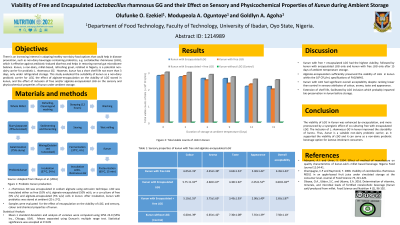Food Science and Nutrition
(PO14-26-22) Viability of Free and Encapsulated Lactobacillus rhamnosus GG and Their Effect On Physical, Chemical and Sensory Properties of Kunnu During Ambient Storage

.jpg)
Olufunke O. Ezekiel, PhD. Food Technology
– Senior Lecturer, University of Ibadan, Ibadan, Oyo, Nigeria- MO
Modupeola Oguntoye, PhD
– University of Ibadan - GA
Goldlyn A. Agoha
– University of Ibadan
Presenting Author(s)
Co-Author(s)
Objectives:
Kunnu, a millet-based gruel is a refreshing beverage relished in Nigeria. However, kunnu has a short shelf life of not more than 3 days, only under refrigerated storage. This study evaluated the effect of inclusion of free and/or alginate-encapsulated probiotic Lactobacillus rhamnosus GG (LGG) on the sensory, physical and chemical properties of Kunnu under ambient storage.
Methods:
LGG was inoculated either as free (10% v/v), alginate-encapsulated (10% w/v), or a co-culture of free (5% v/v) and alginate-encapsulated (5% w/v) cells in kunnu,, the effect of probiotic inclusion on its sensory, physical (colour), and chemical (pH, titratable acidity and total solids) attributes, and the viability of LGG in kunnu, over 15 days storage at ambient temperature (25o ± 2oC) were studied.
Results:
The sensory evaluation showed that despite the significant (p < 0.05) differences observed between fresh probiotic kunnu (with free and/or alginate-encapsulated LGG) and the control (fresh kunnu without LGG) in the attributes of colour, aroma, taste, and appearance, the probiotic kunnu still showed overall acceptability of 49.44% on a scale of 1-9. There was no significant differences (p > 0.05) in the L, a, b colour attributes of kunnu with free (L = 60.85 – 64.54, a = -5.28- -4.56, b = 13.51 – 16.53), encapsulated (L = 60.08 – 63.93, a = -4.89 - -3.69, b = 13.7 – 14.61) and free + encapsulated (L = 62.68 – 63.25, a = -5.04 - -4.15, b = 14.49 – 15.6) during storage. The addition of free and/or encapsulated LGG reduced acidity in kunnu and pH did not significantly change during storage, showing that there was no post-acidification. Results also showed that the kunnu sample with free + encapsulated LGG showed the highest viability (2.6 x 106 CFU), kunnu with encapsulated LGG had 2.13 x 106 while kunnu with free LGG showed the lowest viability (1.98 x 106 CFU) after 15 days of storage at ambient temperature.
Conclusions:
This study showed that encapsulation did not significantly affect the physical and chemical properties of kunnu during storage. The viability of LGG in Kunnu was enhanced by encapsulation, and more pronounced by a synergistic effect of co-culturing free with encapsulated LGG. Thus, kunnu supported the viability of LGG, and it can serve as a non-dairy probiotic beverage option to lactose-intolerant consumers.
Funding Sources: This research did not receive any funding from any organizations.

.png)
